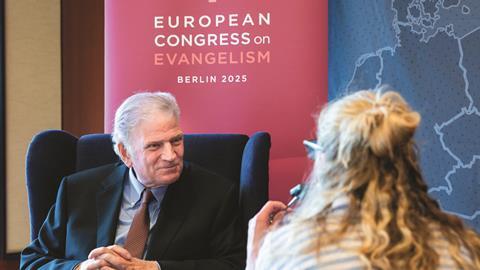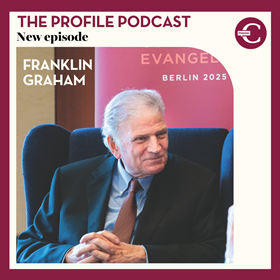The outspoken evangelist is worried European churches are failing to preach the gospel. But people want to know the truth, he says. Christians must grasp the evangelistic opportunities
Franklin Graham is a man who divides opinion – in Europe at least. For some, he is a staunch defender of gospel truth, unashamed of standing up and being counted even when it brings heavy criticism. For others, his outspoken views on Islam (“a very evil and wicked religion”), his willingness to call homosexuality a sin and his vocal support for the Republican party risk compromising the message of love he claims to be preaching.
As the son of Billy Graham, Franklin comes from one of the most well-known Christian dynasties in the world. He initially rejected Christ as a young man, but when he came back to faith aged 22, he was all in. He quickly joined the Christian aid and relief organisation Samaritan’s Purse, began preaching and was eventually appointed president and CEO of both Samaritan’s Purse and the Billy Graham Evangelistic Association (BGEA).
Graham has been criticised for drawing six-figure salaries from both organisations. And his outspoken political opinions may have dented support for Operation Christmas Child, the well-known Christmas shoebox appeal run by Samaritan’s Purse since the 1990s. More controversy came in 2020, when his six-date tour of the UK was postponed after every venue cancelled his bookings, citing opposition to his views, particularly on homosexuality.
Graham refused to back down on the venue cancellations. He took legal action against each one and won every case. He described it as a victory for all Christians: “The Church can be bold and stand up and preach the truth. And if we’re challenged, know that we have the freedom to continue, because we cannot allow just a few people to shut us down because they disagree.”
Since he held his first large-scale evangelistic event more than 35 years ago, Graham has been doing just that, boldly preaching the gospel to more than 8 million people in more than 55 countries. Most recently, he addressed his biggest crowd ever – 440,000 people in Ethiopia’s capital city, Addis Ababa. Thousands responded to the invitation to know Christ, according to BGEA.
Now 73, Graham doesn’t seem to be mellowing with age. When we meet at the BGEA’s evangelism congress in Berlin, he had a stark message for Christians in Europe: the Church has compromised its message, when it has preached it at all. As a result, it has lost the power and authority that accompanies the proclamation of the gospel (see Mark 16:20).
“I want to encourage the Church,” he says. “The gospel does work. We just have to believe it and proclaim it.” It is this straightforward conviction that drove him to gather 1,000 Christian leaders in Berlin, 59 years after his father held a similar event in the city. And it’s what drives him to continue to hold large-scale evangelistic events across the world, despite criticism from some that his style is old-fashioned, or that God is now doing something new among a younger generation.
“What God used for salvation 2,000 years ago, he uses today. It hasn’t changed,” he says. In part, he continues to preach at large-scale gatherings because it is his calling. In part it is “to set an example” to the next generation. When young people see others responding to the gospel, faith rises, he says, and a whole new generation are released. “You don’t have to do more than that. The Holy Spirit will take over from there.”

We’re here in Berlin for a congress on evangelism. Why did you want to put this event on?
Many churches have gone generation after generation with no evangelism – and the Church is suffering.
There are some positive signs with the younger generation. We are beginning to hear things from across Europe and that’s exciting. In the UK, there are 2 million more people in church than a few years ago. That’s huge! It is extremely encouraging to see a younger generation coming forward with excitement and a zeal for the gospel. We’ve got to take what we see and help give it some breath. We want young people to not back down, but to just run with it.
We don’t need to back up. We don’t need to shut up. We don’t need to apologise for preaching and proclaiming the gospel. Just trust God to use his word. Many times, people think: Well, let me help God’s word. Let me add this or add that. Don’t add nothing. Just preach the gospel and God will use that.
The recent move of God among Gen Z appears to have happened without many large-scale events. Do we still need proclamation evangelism?
There’s no question that there is a place for the way we do it. But you don’t have to have a big stadium to preach, or a big platform. When you declare the gospel, there’s Holy Spirit-filled power – whether you’re speaking to an audience of ten people or 110,000 people.
Jesus didn’t come to give people a better life. He came to give them eternal life
Some reports are suggesting young people are joining more traditional denominations, such as the Orthodox and Catholic churches, who are arguably clearer on moral issues such as abortion and sexuality. Do you think that other denominations have damaged their own mission when they haven’t been clear on where they stand?
I think churches that have compromised on God’s word have damaged themselves, no question. And we’ve seen a generation leaving them because they offer nothing. The churches that are growing are holding to the word of God.
I can’t speak for the UK, but in my country, we see some mainline denominations have compromised on sexuality. Some have turned to a social agenda. People don’t want to hear a social message when they come to church. And they’re not afraid if God says: “This is a sin, OK?” They want to know what God thinks. There’s a generation out there hungry to know what God is saying.
You lead BGEA and Samaritan’s Purse. One has a strong evangelistic focus and the other is geared towards aid and relief. Which do you think is more important?
Both of them are evangelistic organisations. Samaritan’s Purse just happens to use wars and famines and diseases to help people so that we can tell them about Jesus Christ. Everything we do at Samaritan’s Purse is in the name of Jesus. So, it’s not either/or – they’re both the same. In one, we take stadiums or hold conferences. The other, we take the ditches, gutters and the battlefields of the world. But it is to share Christ. I don’t distinguish between the two.
What would you say to the Christian who argues that we just need to feed people, or meet their practical needs, and they’ll come to know God through seeing our love. Is that wrong?
No. Samaritan’s Purse feeds millions of people every year. But if all I do is feed them, they’re just going to be hungry again tomorrow. But if I feed them and tell them about a God who loves them, who sent his Son from heaven to earth to die for their sins, and if those people turn and put their faith and trust in Christ, I’ve done something for that person. They are now going to be alive for eternity in heaven.
Feeding people is important, but that’s not why Jesus came. He fed people while he was here, but his purpose was to take the sins of humankind and go to the cross. He didn’t come to give people a better life. He came to give them eternal life.
How do you see the role of older leaders in releasing and equipping the next generation in a moment like this?
Well, first of all, I think setting an example. Being able to go to ExCel London and preach an evangelistic message – to give an invitation and watch people go forward to confess their sins, repent and believe in the name of the Lord Jesus Christ – for young people to see this…You don’t have to do more than that. The Holy Spirit of God will take over from there.
Let it be a witness to another generation: the gospel works.
I remember preaching once in Australia. There was a group on the front row called ‘the 59ers’. They heard my father preach and gave their lives to Christ in 1959. Well, over the years, the word was that evangelism doesn’t work. It’s old-fashioned. We need a new way to communicate. So I preached, I gave an invitation, people were coming forward to receive Christ. And one of those guys elbowed his friend and said: “Guys! I told you – it still works!”
Churches that have compromised on God’s word have damaged themselves
The gospel does work. We just have to believe it and proclaim it. We don’t need to help the gospel. Don’t change it. Don’t leave something out because you’re afraid you’re going to offend people. The gospel is offensive. But God uses that to unlock people’s hearts. He doesn’t call everybody. In that stadium, several thousand people came forward, but many thousands more just sat back in their seats and said: “No, thank you.” That’s OK. You’ve given the opportunity.
The decision they make is between heaven and hell. It’s a very serious business. A person can go to jail and have hope that one day, they might get out – even a murderer. There’s no second chance in hell. It’s sealed for eternity, and that’s a frightening thought.
It’s by faith – simply believing that Jesus Christ is God’s Son, that he died and shed his blood on a cross for our sins, that he was buried, that God raised him to life on the third day. By believing that and coming to God in repentance, turning from our sins, God will forgive us and give us eternal life. That’s a good deal.
To give another generation the opportunity to take this message and share it with the world is so important.

Are you saying that the Church in Britain has failed to do proclamation evangelism, so you have to come and do it for us?
Giving an evangelistic message is something every pastor should be able to do from his church. But most churches are not doing that, and they should be.
Some people are afraid that they’ll give an invitation and nobody will come forward. The first time I preached the gospel, I was invited to Saskatoon, Canada, by one of my father’s associates. I didn’t want to go, but he kept insisting. So I went and preached. And nobody came forward. I said: “See? I told you I shouldn’t be doing this!” Then, 20 years later, I met a man. He said: “I came to faith at your meeting in Saskatoon.” I said: “I don’t remember anybody coming forward that night.” He replied: “I didn’t. But I went home, and I felt so under conviction that I got on my knees, asked God to forgive me and invited Christ to come into my heart.”
That’s the power of the gospel. Church leaders just have to be faithful. Give a gospel message. Give an invitation. If nobody comes forward, that’s OK. You’ve done your job. But then again, there will be people who will come forward. And if this happens every week or every month, the church will grow. People want to know the truth. They want to know how they can have a right standing before God.
What’s your advice to Christians who feel nervous or ill-equipped to share the gospel with their family, friends, colleagues?
Why would we be terrified to share the gospel? What does the word ‘gospel’ mean? It means ‘good news.’ It’s good news that God loves us.
It’s good news that God sent his Son from heaven to this earth to take our sins. And we can experience God’s forgiveness by simply believing that good news. I mean, that’s a good deal. Why would we be afraid to share that?
But lots of people are…
Well, you know, the devil wants to discourage us. He’ll say: “Don’t say that. They won’t believe you.” Or: “Don’t share that. They might ask you questions you can’t answer. Just be quiet. Let them go their way and you go yours.” That’s what the devil does. He tries to shut you up with fear.
Don’t be afraid. That’s what Jesus told Peter when he caught all those fish (see Luke 5:10). Don’t be afraid, Peter. You think this is good stuff? You just wait…
To hear the full interview, listen to Premier Christian Radio at 8pm on Saturday 12 July or download ‘The Profile’ podcast








































1 Reader's comment